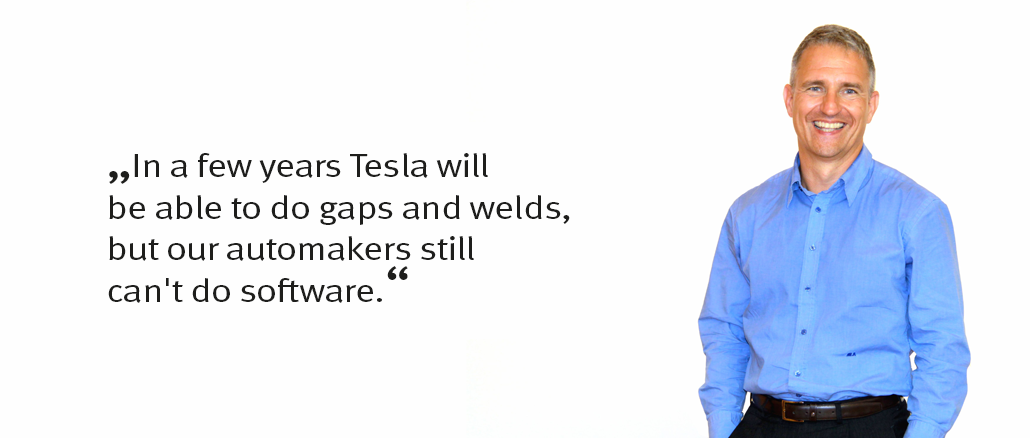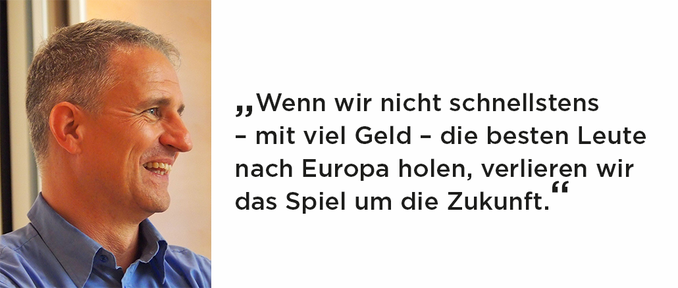
The AI expert Markus Ahorner, founder and managing director of Ahorner & Innovators GmbH, sees the danger that Europe will say goodbye to the world’s best in terms of technology. At least that’s the case in AI and digitization, he claims in an interview.
You are an expert in artificial intelligence. What exactly does your company do?
The field of AI in which the most rapid progress is taking place is “machine learning”. Our company works in this area: We develop algorithms and data models for industrial optimization. Or more generally: We use data models for analyzes, for root cause research and for specific improvements in industrial processes in research, development and production. The optimizations are manifold: increase of profit, reduction of CO 2 or other emissions, quality improvement, etc.
How can you describe your clientele?
We work almost exclusively for corporations, two thirds of which are in the process industry, i.e. chemicals, energy and pharmaceuticals. Very large quantities or very expensive goods are produced there; and if you achieve an improvement of just a few percent, that is already very large amounts of money or emission reductions. Some of our customers come from retail or logistics. And we support maintenance and technical services, for which we are also developing new, digital business models.
How does AI work in principle?
Machine learning works empirically. This means that the computer recognizes in the data the rules according to which the data was created. He adjusts his program to this data again and again when the data changes. That is the difference to classic programming.
In the past, the programmers first laid down the rules and the program functions and then fed the system with data. We take the opposite approach: We retrieve the data from large memories, for example process data from production sequences or status data from machine controls, and the computer develops a data model from it fully automatically.
Of course, the AI system doesn’t know how the data came about. But it can learn to group the data into appropriate groups, like sorting apples and pears. It does this based on the properties of the data. We call this classifying.
Or the AI system can find a formula that describes how the real environment works. We call this regression. Once the system has found this formula, it can use this formula to calculate better operating points or predict a failure.
As for students learning to solve word problems, the task is not to memorize it, but to recognize the patterns and the idea behind them. To find solutions even in new and unfamiliar situations. Machine learning works in a very similar way.
How does the user benefit from using AI? Does he even notice whether there is AI in an application program or not?
In production, the benefit arises from lowering costs, becoming faster or producing products of better quality. In logistics, goods arrive at their destination more punctually. And in maintenance, operation and repairs are more predictable, more cost-effective and also more fail-safe. With AI support, people can make better decisions more quickly and can keep track of things better even in situations in which a lot of information affects them.
Let’s take an example: a highly automated factory is extremely complex and it generates a lot of data. Because data and production conditions change so quickly, no one can find the optimal settings for all machines and systems in all situations. So there is a lot of room for improvement. AI automatically converts this data into a data model and independently finds the optimal settings. If the factory changes or the data changes, new learning takes place. For example, machines then last longer, or production output increases and production costs and CO2 emissions decrease.Of course, the user knows that AI is helping him make decisions, but he doesn’t notice it in everyday life.

A few months ago you sounded the alarm because Germany was falling further behind in terms of AI implementation. To whom?
To yourself, and therefore to the rest of the world, I believe. This is due to our decades of engineering tradition. We are specialists in things that can be touched, machines, cars, steel in general – that is, mechanical engineering. We are traditionally also very good at chemicals and pharmaceuticals. But these are inventions that are essentially a hundred years old.
But we are not good at software. We literally slept through software development. I meet many managers who to this day have not really understood the business models of Amazon, Facebook or Google. And not only are we years too late: catching up is also becoming more and more difficult. Because the big digital companies are developing faster than we can catch up with the previous gap. You are sitting on huge financial resources and gigantic amounts of data. So the distance is getting bigger and bigger. Because: Digital developments are exponential. It’s kind of a recombination of innovation: when you combine two digital inventions, you have another new one. And that happens all the time somewhere in the world.
Take the car manufacturer Tesla as an example: For a long time, many people thought that Tesla was primarily about electric drives, but that Tesla could otherwise not build cars as well as traditional manufacturers. And they thought the rest was a giant marketing bubble.
But investors are not naive! If they’re buying Tesla stock, it’s because Elon Musk has a vision. While in Germany gaps and weld seams, i.e. manufacturing technology, are being improved, Tesla is busy collecting data and developing automotive operating systems and autonomous driving. And I fear that Tesla will get the manufacturing technology done faster than the German manufacturers the software.
Why is it so important? The amount of data is growing exponentially. It has doubled every year since 1946, which means that humanity generated as much data last year as in all the years since the invention of the computer up to 2019. And this year the world stock of data will double again. Now the question can be asked, who should process this data in the first place? Humans won’t be able to do that, but machines, i.e. AI.
The only thing is: if you are not at the top today, you will probably not be able to get there either. I like to use this image: We are still discussing here whether to take a taxi or a bus to the station while the train is already leaving. That is a shame, because up until about ten or fifteen years ago, in my opinion, we could have easily made the connection.
When the topic of Industry 4.0 came up 10 years ago, German companies seemed to be at the forefront. Was that an illusion from the start, or did you not pursue the topic with the necessary vigor?
I think we had the bad luck that we were at the forefront of technology in mechanical engineering. Not only that one then becomes sluggish and cautious about innovations. Bringing existing systems or factories into the digital age at a later date is much more time-consuming than designing, setting up and connecting a modern digital structure on the green field or in the empty hall. Our machines communicate little with one another, they save little data, and data acquisition is time-consuming. That’s a disadvantage.
We are also world champions in standardization in Germany. Norms are extremely useful, but setting them takes time, and this idea no longer fits at all, especially not with AI. Software developers don’t care much about standards. The product that penetrates the market also often sets the standard. And those who are not there with products will not set any relevant standards for their application in the future. If he is unlucky, he will simply no longer receive deliveries at all.
They also claim that the backlog in AI is growing exponentially and that we can no longer catch up today. Why is that?
Because in Germany and Europe we do not promote and develop AI from industry, but with public money. How does it work in the US, on the other hand? The big ones like Amazon, Apple, Google, Facebook, Tesla or Netflix are driving the development. Because they recognized the economic potential of processing very large amounts of data early on, and today they are the most profitable companies on the planet.
As a mathematics company, we have been making the same experience for many years: it is not always about scientific progress, but often about turning research money into action. We and many start-ups have ready-made solutions for many tasks in the drawer. This is because the data technology solution principle is always the same or at least very similar. But we have a research industry in Germany. It processes funding because both of them are there – the funds and the institutes. Even if some institute researches again in areas that have been known in a similar form for a long time. I dare to say that, especially in Germany, many small companies are further ahead than some universities, with an increasing trend.
What are the consequences of this development?
I fear that we can no longer afford to waste this time. Sooner or later they will lead to de-industrialization, because in this way we make ourselves an extended workbench. Let’s take Tesla again as an example. Why are they going to Germany? This puts you right in the heart of the automotive industry: Teslas will soon be coming from Germany, that’s a seal of quality.
Why shouldn’t Elon Musk mercilessly poach all good manufacturing engineers away? Then gaps and weld seams would no longer be an issue in a short time. He would manufacture car bodies just as well as the German premium manufacturers. Nevertheless, the German manufacturers will not be able to use software for years to come. For me the cards have already been given out.
In addition to AI, you mention quantum computers as an example of a lost future technology. How is the situation there for us?
I have to rely on the opinion of third parties, I am not an expert in the field. But when the quantum computer comes, it will not leave anything behind in the industry, it will be the next revolution in the computer industry. That won’t happen suddenly, of course, but it will gradually and consistently establish itself. I expect the first industrial quantum computers to be available in five to ten years. This means that all currently common encryption methods, including those for cryptocurrencies, are obsolete. A quantum computer cracks the current codes in a split second. It enables economies of scale in chemical and pharmaceutical development that we cannot even dream of today.
Experts from computational chemistry and the life sciences tell me that US companies also have a big lead in the field of quantum computers. At the moment it’s still an industrial playground, but if we don’t get the best people to Europe quickly – with a lot of money – we may lose this game too.

Know-how and computer programs can be bought. What would be so bad about it – the costs, the dependencies?
Those who buy programs buy the application, but not the know-how. So far, we have retained the intellectual property of important inventions in Germany. Others could recreate something, but could not develop it further on their own. That made us rich and the others more or less stayed behind. Now the tables are turning.
Now the others are developing and we can no longer keep up. I see it really quite dramatically: If we are not very fast, Europe will slip on the inclined plane into the Third World. Of course, that won’t happen in the next five years, because we still have preserves in the basement in Germany. But seen over a generation, it can happen quickly.
My daughter is a mathematician, my two sons are studying computer science. I am not afraid that they will become unemployed, on the contrary. But neither will I unconditionally advise them to stay in Germany for the rest of their lives.
They say that the backlog in the use of AI results in higher production costs which, in the interests of competitiveness, force lower wages and salaries. Does that mean we have to say goodbye to our prosperity in the medium term?
There are not many blank spots left on the map where we still have the chance to rise to the top of the IT world. If we had pushed the topic of autonomous factories around 2013, we would have had the chance to bring production back from low-wage countries and at the same time sell smart factories to the world. From my point of view, far too little has happened. If we don’t succeed in doing this after all, we will at least have to say goodbye to an important component of our prosperity.
They fear the downfall of the German middle class. What is your assumption based on? After all, medium-sized companies have to buy their machine and production control programs including licenses anyway – regardless of whether they come from the USA, China or Germany.
The threat of relegation is not an AI phenomenon, but an effect of digitization. Digitization favors large companies that produce large quantities – for one reason: marginal costs (the first derivative of the production cost curve) approach zero – at least in theory. Small companies hardly have lower investment costs to be part of digitization, but their investments scale worse once they have a small target market.
Of course, this is especially true for the B2B business, where you don’t have eight billion potential smartphone customers. In relative terms, the smaller the company, the more expensive it is to invest in IT.
So far, the middle class has been the mainstay and strength of the German economy. Why do you think that in the future it will become a block on the leg?
Precisely because of the low marginal costs: Digitization prefers large companies with high penetration of mass markets. Not only in terms of economies of scale, but also in terms of employees: If a medium-sized company wanted to develop something new up to now, it would go to a regional university, get a few graduates and get started with the newly acquired knowledge.
In IT it is no longer so easy, because the SME may not be able to pay the IT specialists in the future. And they don’t necessarily want to go to East Westphalia or the countryside in Lower Bavaria, but to chic cities like Hamburg, Berlin, Munich or Leipzig – and work from their home offices.
Such people don’t want to go to the provinces and they don’t like the smell of oil in factories. And they can allow themselves that. To put it bluntly.
Then there is the communication problem: mechanical engineers and computer scientists do not understand each other well. Anyone who knows automotive development knows how often the two faculties talk past one another. In addition, there are few managers in German corporations who can lead a team with mathematicians or computer scientists. It’s different with Google and Apple, Tesla and Facebook, which is why such companies are so attractive to these people.
In summary: We have an investment backlog, we are lagging behind in education, especially in the MINT area, and we have few attractive jobs for computer scientists and mathematicians. So I’m afraid that it will hit medium-sized companies, especially the traditional automotive suppliers, hard. My prognosis is that regions with a high density of SMEs, such as Baden-Württemberg, are threatened with enormous decline if they do not take countermeasures there quickly.

You don’t get tired of people with data. We will always need a wide variety of goods and services. Can’t we leave all the “IT stuff” to others and concentrate on the physical world? Or will we then become 3rd world?
We will of course also continue to optimize the analog world of goods production, but there is a big catch: Germany is not known for its super low manufacturing costs. If you want to continue to focus on analogue production in the future, the manufacturing costs will have a massive competitive disadvantage. If we wanted to bring them down to an international level, we would have to bring not only our energy costs but also our wages and salaries closer to the international average, and that would hurt our social system very much.
But if we don’t want to become the new 3rd world, then we need advantages that none of the others have. But others can now also deep-draw and punch sheet metal. And already we’re back to intellectual work, but intellectual work will increasingly be digitized with AI. So if our intellectual competitive factor is not in AI and digitization, where is it?
Can anything still be saved through a joint effort, a technology alliance of industry, science and the state? What do you have to do? Or are we standing in front of the gates of hell: “Lasciate ogni speranza!”?
The sentence is good, it is from the Divine Comedy. And Dante had a good guide, Virgil, a highly educated man of his time.
In my opinion, the key to maintaining our prosperity is through education and training. But unfortunately I see a fundamental educational problem in Germany. We have to learn to recognize and encourage gifted people – and not to suppress them.
This does not only apply to locals: We have millions of immigrants, among whom, depending on the definition, there are so many percent of the gifted. That’s tens of thousands of people. But we hardly have a chance to discover them. Instead, we prevent them from developing with formalities, let them work as couriers, packers or cleaning assistants, if at all. We are wasting a tremendous amount of potential.
We also overlook many talents among the rest of the population. Of course we also need technology alliances, but my question is: with which minds? Where is the next generation of mathematicians, computer scientists, physicists and specially trained engineers?
And we mustn’t forget one thing: if we started an education offensive today, we wouldn’t see the first successes for 20 years. That is a lot of time in view of the digital development. And we haven’t even started yet!
I still have one hope: We have a really fertile start-up landscape here in Germany. There are excellent scientists, computer scientists, engineers and mathematicians who are unfortunately hampered by a very slowly growing digital market and a lack of capital. The industry is too hesitant, and investors willing to take risks are in short supply in Germany.
The game is not quite over yet, but we don’t have many playing fields left. Perhaps one thing is the autonomous factory, but we have to push the tube there too.




